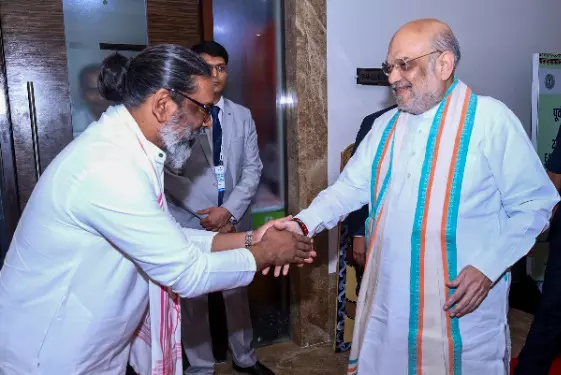Home Minister Amit Shah to chair Eastern Zonal Council meeting in Ranchi on Thursday

Ranchi: Union Home Minister Amit Shah will chair the Eastern Zonal Council meeting here on Thursday in which around 70 representatives from the four eastern states - Jharkhand, Bihar, Odisha and West Bengal - will participate, officials said.
Shah arrived in Jharkhand's capital Ranchi around 10 pm on Wednesday to chair the meeting for which security has been beefed up in the city.
Under Sections 15 to 22 of the States Reorganisation Act, 1956, five zonal councils were established in the country.
The union home minister is the chairperson of these five zonal councils, and the chief ministers or lieutenant governors or administrators of the member states and Union territories are the members.
"Massive security arrangements have been made in Ranchi in view of the Eastern Zonal Council meeting here to be chaired by the home minister," an official said.
The zonal councils take up many important matters, including issues related to national importance such as the speedy investigation of cases of sexual offences against women and children, implementation of Fast Track Special Courts (FTSC) for their swift disposal, providing brick-and-mortar banking facilities within the designated area of every village, implementation of the Emergency Response Support System.
Various regional-level and common-interest issues, such as strengthening nutrition, education, health, electricity, urban planning and the cooperative system, are also discussed during such a meeting, the official added.
From Jharkhand, Chief Minister Hemant Soren, Finance Minister Radhakrishna Kishore, Minister Deepak Birua, Chief Secretary Alka Tiwari, Principal Secretary (Home) Vandana Dadel, and DGP Anurag Gupta will attend the meeting, another official said.
After about a fortnight, Soren returned to Ranchi late on Wednesday to attend the meeting as he was in Delhi, where his father and former chief minister Shibu Soren is undergoing treatment.
Bihar is being represented by ministers Vijay Choudhary and Samrat Choudhary who arrived here on Wednesday, the official said, adding that Odisha's delegation includes Chief Minister Mohan Charan Majhi and Deputy CM Parvati Parida who also reached Ranchi.
West Bengal will be represented by Minister Chandrima Bhattacharya.
Jharkhand, among other matters, is likely to raise the issue of Rs 1.36 lakh crore pending dues from PSUs, such as Coal India, in view of mining.
The Ranchi Police have already issued a traffic advisory, prohibiting auto-rickshaws between Birsa Chowk and Sujata Chowk on July 10.
Besides, the entry of goods vehicles into the city limits will remain restricted from 6 am to 10 pm on Thursday.
The meeting was originally scheduled for May 10 but was postponed in view of the India-Pakistan tense situation then.
As per the government, the chief minister of one member state (rotating every year) acts as the vice-chairperson while the governor nominates two ministers as members of the council from each member state.
Each zonal council has also formed a permanent committee at the level of the chief secretaries. Issues proposed by the states are initially presented to the permanent committee of the concerned zonal council for discussion, the officials said.
After consideration by the permanent committee, the remaining issues are then presented to the zonal council meeting for further deliberation.
Prime Minister Narendra Modi emphasised the need to leverage cooperative and competitive federalism for the all-round development of the country, they said.
With a belief that strong and vibrant states make a strong nation, the zonal councils provide a structured mechanism for dialogue and discussion on issues affecting two or more states or the Centre, and these serve as an important platform to enhance mutual cooperation, they added.
The role of the zonal councils is advisory, the officials said.
However, these councils, over the past few years, have proven to be an important factor in promoting healthy bonds of mutual understanding and cooperation in various fields.
More than 60 meetings of the various zonal councils and their permanent committees have been held in the last eleven years, they added.



